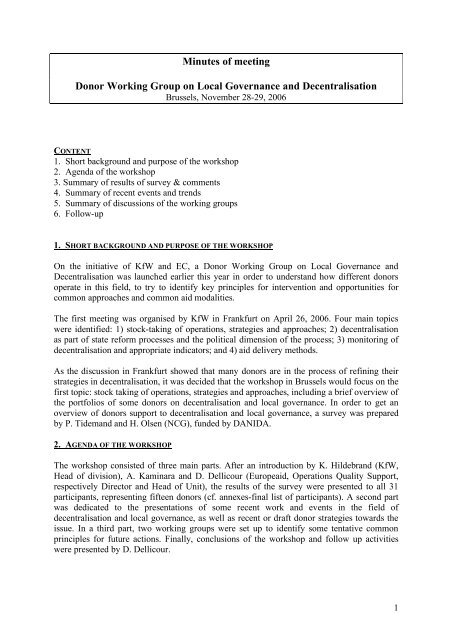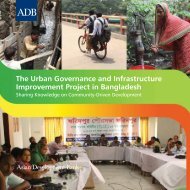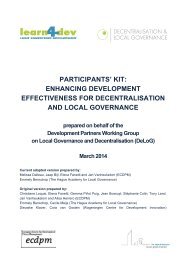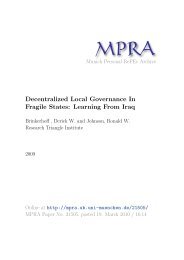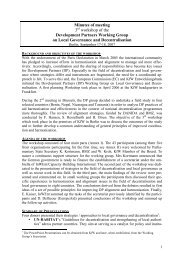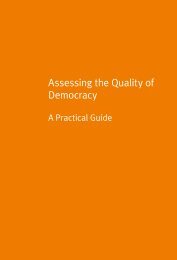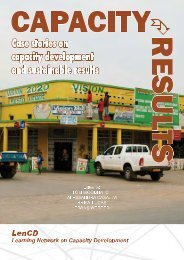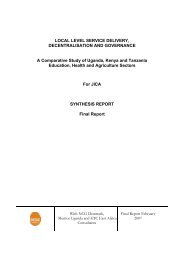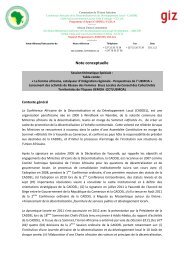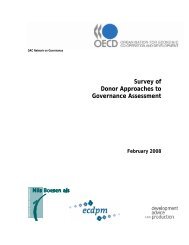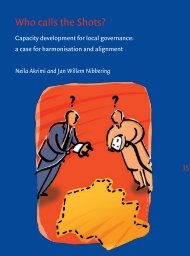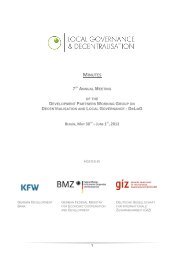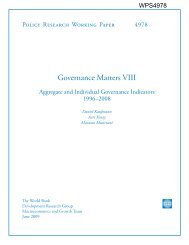Final Report/Minutes of meeting - DeLoG
Final Report/Minutes of meeting - DeLoG
Final Report/Minutes of meeting - DeLoG
You also want an ePaper? Increase the reach of your titles
YUMPU automatically turns print PDFs into web optimized ePapers that Google loves.
<strong>Minutes</strong> <strong>of</strong> <strong>meeting</strong>Donor Working Group on Local Governance and DecentralisationBrussels, November 28-29, 2006CONTENT1. Short background and purpose <strong>of</strong> the workshop2. Agenda <strong>of</strong> the workshop3. Summary <strong>of</strong> results <strong>of</strong> survey & comments4. Summary <strong>of</strong> recent events and trends5. Summary <strong>of</strong> discussions <strong>of</strong> the working groups6. Follow-up1. SHORT BACKGROUND AND PURPOSE OF THE WORKSHOPOn the initiative <strong>of</strong> KfW and EC, a Donor Working Group on Local Governance andDecentralisation was launched earlier this year in order to understand how different donorsoperate in this field, to try to identify key principles for intervention and opportunities forcommon approaches and common aid modalities.The first <strong>meeting</strong> was organised by KfW in Frankfurt on April 26, 2006. Four main topicswere identified: 1) stock-taking <strong>of</strong> operations, strategies and approaches; 2) decentralisationas part <strong>of</strong> state reform processes and the political dimension <strong>of</strong> the process; 3) monitoring <strong>of</strong>decentralisation and appropriate indicators; and 4) aid delivery methods.As the discussion in Frankfurt showed that many donors are in the process <strong>of</strong> refining theirstrategies in decentralisation, it was decided that the workshop in Brussels would focus on thefirst topic: stock taking <strong>of</strong> operations, strategies and approaches, including a brief overview <strong>of</strong>the portfolios <strong>of</strong> some donors on decentralisation and local governance. In order to get anoverview <strong>of</strong> donors support to decentralisation and local governance, a survey was preparedby P. Tidemand and H. Olsen (NCG), funded by DANIDA.2. AGENDA OF THE WORKSHOPThe workshop consisted <strong>of</strong> three main parts. After an introduction by K. Hildebrand (KfW,Head <strong>of</strong> division), A. Kaminara and D. Dellicour (Europeaid, Operations Quality Support,respectively Director and Head <strong>of</strong> Unit), the results <strong>of</strong> the survey were presented to all 31participants, representing fifteen donors (cf. annexes-final list <strong>of</strong> participants). A second partwas dedicated to the presentations <strong>of</strong> some recent work and events in the field <strong>of</strong>decentralisation and local governance, as well as recent or draft donor strategies towards theissue. In a third part, two working groups were set up to identify some tentative commonprinciples for future actions. <strong>Final</strong>ly, conclusions <strong>of</strong> the workshop and follow up activitieswere presented by D. Dellicour.1
3. SUMMARY OF RESULTS OF SURVEY & COMMENTSThe survey gives a picture <strong>of</strong> current donor practices and strategies in decentralisation andlocal governance by analysing the portfolio and selected core documents from seven donors(Belgium/BTC; Denmark/Danida; EC/EuropeAid; France/DGCID & AFD;Germany/BMZ,GTZ, KfW & InWEnt; Netherlands/DGIS; Switzerland/SDC).On the basis <strong>of</strong> an analysis <strong>of</strong> 500 projects, two main conclusions were formulated:1) the dominating approach for delivering decentralisation and local governance interventionsis still the project approach: a large number <strong>of</strong> interventions constitutes <strong>of</strong> local governanceprojects or area based programmes, whereas larger decentralisation reform programmes,linked to public administration reform are not very common (10%);2) The average size <strong>of</strong> project budget is relatively small, indicating relative high transactioncosts involved in administration. Some donors, however, are moving towards increased use <strong>of</strong>sector programme support with more sector budget support and basket funding modalities.Five key issues emerged from the analysis:1) Joint support national programmes constitute only a small part <strong>of</strong> the projects but emergeas a best practice;2) Area based programmes present risks such as resource distortions but are still justified inspecific cases;3) Tensions are observed between decentralisation and sector support, by far the mostimportant part <strong>of</strong> development aid;4) Decentralisation and local governance are not always complementary and conflictsbetween both can arise;5) As many donor organisations are working on the topic, it would be worthwhile to considersome division <strong>of</strong> labour to avoid duplication <strong>of</strong> efforts.Overall, the way forward lies in harmonization and alignment at country level, enhancingcountry owned decentralisation strategies, and alignment <strong>of</strong> donor support around thesestrategies.The survey, whose main purpose was a stock-taking exercise while showing similarities anddifferences between donors, was unanimously positively welcomed by the participants andled to a valuable reflection on the current practices in decentralisation and local governance.Oral remarks and written comments prior to and following on the <strong>meeting</strong> were to be taken onboard by the consultants to finalize the report.As was pointed out in the comments following on to the presentation, the study demonstratesthat the political dimension <strong>of</strong> decentralisation does not appear to be integrated a major issuein current donor practices, although the importance <strong>of</strong> considering decentralisation as apolitical process was very much highlighted.The survey also indicates that donors still have a long way to go when it comes toharmonization. It was emphasized that harmonization does not mean "standardized" orblueprint approach for all donors and that the use <strong>of</strong> different entry points by different donorsis perfectly acceptable as long as the overall coherence is ensured.Some donors highlighted the interest <strong>of</strong> taking a look at concrete harmonization practices onthe field and to undertake selected country assessments on how we perform as donors.2
Some participants stated the need to be more precise when it comes to definitions (eg. forsome donors, deconcentration is not part <strong>of</strong> decentralisation). Before touching issues <strong>of</strong>harmonization, we should evolve towards a common understanding <strong>of</strong> what exactly we aretalking about.There is a need <strong>of</strong> a more detailed analysis on some important issues. First <strong>of</strong> all, specificanalysis should be undertaken on the use <strong>of</strong> sector support and budget support in the area <strong>of</strong>decentralisation and local governance, as they are key instruments for an effectivedecentralisation, taking into account local capacities and their development. There is also aneed for a better understanding, and approach, <strong>of</strong> the mainstreaming <strong>of</strong> decentralisation inother sectors. Thirdly, we need a better understanding <strong>of</strong> the impact <strong>of</strong> decentralisation onpoverty alleviation.4. SUMMARY OF RECENT EVENTS AND TRENDSDuring the workshop, recent events in the field <strong>of</strong> local governance and decentralisation werepresented. KfW presented the conclusions <strong>of</strong> the recent workshop on local governance inKigali, Rwanda, aimed at establishing the bases for a performance-oriented support to localgovernance in Africa. Furthermore, EuropeAid presented the main elements <strong>of</strong> their finaldraft Concept paper on decentralisation and local governance.Five donors also presented their strategy or approach towards local governance anddecentralisation 1 :- the French approach to local governance as democratic governance at local level, anddecentralisation,which is considered as a process and a major political reform, as a means toachieve local governance;- the new governance strategy <strong>of</strong> DANIDA (08/06), with a first focus on public sectormanagement, and that approaches decentralisation both as a means and an end 2 ;- the UNCDF strategy, with a focus on local government capacity building and local serviceand infrastructures delivery;- Dutch development cooperation, stressing sector reform programmes and the involvement<strong>of</strong> different parties and levels;- the World Bank decentralisation/local governance approach (as laid down in differentdocuments such as the Governance and Anti-corruption Strategy, 2006), that deals with localgovernance and decentralisation not as an end in itself but as a means to improving overallgovernance and service delivery.5. SUMMARY OF DISCUSSIONS OF THE WORKING GROUPSWorking group 1: Relations between decentralisation reform, public sector reform andreforms in different sectors.An initial "tour de table" allowed identifying various key issues in the relationship betweendecentralisation reform, public sector reform and reforms in different sectors. Some <strong>of</strong> thesewere:1 For an overview <strong>of</strong> the different presentations, see ppt presentations2 The representative <strong>of</strong> Danida informed later the donor working group that "the point <strong>of</strong> decentralisation being ameans and an end at the same time has been reconsidered, and the conclusion is that no matter howdecentralisation is viewed vis-a-vis poverty reduction, economic growth, democratisation and popularparticipation, it remains a means to achieve these objectives."3
• Definitions: the need to have a common understanding <strong>of</strong> what is meant byDecentralisation, Devolution and Local Governance• Decentralisation as part <strong>of</strong> a public administration reform process and a political reform• Leadership and facilitation <strong>of</strong> Decentralisation including the participation <strong>of</strong> themunicipalities through their Local Government Associations• Inter-ministerial coordination: necessity to ensure appropriate coordination andcommunication between Ministries to enable them to work in a synchronized manner• Local service delivery: the challenge <strong>of</strong> reinforcing the capability <strong>of</strong> delivering effectiveservices by different sectors working at local level• Data collection and indicators: challenge <strong>of</strong> measuring contribution <strong>of</strong> Decentralisation toimproving service delivery at local level• Accountability: how to structure our programmes to reinforce accountability• Legal framework coherence: coherence <strong>of</strong> sectoral and decentralisation legal frameworks• Legitimacy vs efficiency <strong>of</strong> service delivery• Use <strong>of</strong> incentives such as "performance grants"Efforts were made to share views and understanding on the meaning <strong>of</strong> "Decentralisation".Some development partners (DPs) see Decentralisation as a process <strong>of</strong> political nature thatlegitimises and institutionalises power at regional and municipal level within a state reformprocess. Decentralisation is also seen as a means to achieve improved services at local level inwhich the politics <strong>of</strong> Decentralisation are key for their achievement, that is, taking dueaccount <strong>of</strong> the actors and factors that affect it (ex. elites capturing, sector contexts, etc.). Theexchange <strong>of</strong> views was useful to set the basis and recognising inclinations among DPs forfurther discussions on the subject matter.It was felt that the dual dimension <strong>of</strong> Decentralisation (Devolution and Deconcentration)whether addressed with a top-down or bottom-up approach calls for a systemic and multiactorconsideration to ensure the effectiveness <strong>of</strong> the analysis regarding institutionalrelationships, leading and facilitating actors, pockets <strong>of</strong> resistance, and other factors thatimpact the decentralisation process and its articulation with other sectors. Participants pointedout that dialogue is <strong>of</strong>ten limited to the Ministry <strong>of</strong> Local Government or sectoral ministries,forgetting the key role <strong>of</strong> the Ministry <strong>of</strong> Finance and the intergovernmental fiscal system inthe process <strong>of</strong> decentralisation and the important role <strong>of</strong> Local Government Associations.It was also pointed out that too <strong>of</strong>ten bottlenecks to Decentralisation dynamics are caused byinconsistencies in the national legal frameworks, stressing the need to encompass the review<strong>of</strong> sectoral laws and regulations with respect to the decentralisation legal framework. Thetension between two or more bodies <strong>of</strong> laws and their related sectors calls for a clearleadership to provide guidance and oversight over a reform <strong>of</strong> the state and its subnationalsystem. Participants believed that the leadership should rest on a central <strong>of</strong>fice (PrimeMinister or Presidential) as only level <strong>of</strong> authority that could ensure a proper structuring <strong>of</strong> therelations and coordination between sectors and the decentralisation process.Due to lack <strong>of</strong> time, many issues were not discussed and it was agreed that the countryassessments to be carried out should take into account the issues identified to clarify andillustrate DPs support to Decentralisation and provide them with a better understanding inorder to sharpen their future actions.4
Working group 2: Interactions between Community-Driven Development (CDD)approaches & concepts and the institutional support to decentralisation.The challenge that was discussed in this working group was how to bridge links between thetwo types <strong>of</strong> actors (municipalities and community based organisations) and their respectivelegitimacy (through local elections for municipalities and based on socio-cultural andanthropological factors for community based organisations).The question <strong>of</strong> departure was how to create better articulation and synergies between the twomain approaches that currently co-exist: decentralisation and local governance support,emphasising the institutional level, and community based programmes. There was aconsensus that the approaches are not mutually exclusive and that both have pros and cons.CDD and institutional support to decentralisation are no abstract strategies, they depend on acontext and so the point <strong>of</strong> departure should be the specific country situation.It was felt that a too strong emphasis on CDD might lead to the creation <strong>of</strong> parallel structuresthat can even bypass local governments. It was stressed that bypassing local governmentspowers and authority is to be avoided. In this context, the question <strong>of</strong> alignment aroundgovernment policy is <strong>of</strong> capital importance. As far as possible, government strategies shouldbe the starting point <strong>of</strong> each intervention. Where conditions are not in place or there is aresistance from the part <strong>of</strong> the government, other entry points such as CDD could beenvisaged.If micro-projects programmes or CDD programmes are envisaged, however, variousimportant issues have to be taken into account: 1) continuous dialogue with the localgovernment should take place as far as possible; 2) these programmes should be incorporatedinto the local governance system as much as possible ; 3) they can also be considered as anentry point to enhance institutional capacities <strong>of</strong> local governments ; 4) the question <strong>of</strong>democratic legitimacy: it is important to conceive CDD so as to introduce democraticpractices in communities and empower people to become change agents, and 5)harmonization with other donors on the field remains vital.At the same time, it was emphasised that alignment and harmonization do not exclude thepossibility <strong>of</strong> envisaging pilot projects that aim at innovation in local governance and localdevelopmentAs an example <strong>of</strong> interaction between CDD and decentralisation processes, it was madereference to the agreement signed in Benin between the EC support programme todecentralisation (Programme d'appui au démarrage des communes - PRODECOM) and theWorld Bank CDD Programme (Projet National d'appui au Développement Conduit par lesCommunautés- PNDCC) whose objective is to facilitate in a coordinated manner thedevelopment <strong>of</strong> municipal capacities.Other topics raised :- the utility to look at decentralisation through the concepts <strong>of</strong> demand and supply;- the importance <strong>of</strong> sustainability <strong>of</strong> our actions;- the need to ensure pro-accountability mechanisms;- the need to take into account the anthropological approach to decentralisation, that looks atthe communitarian system <strong>of</strong> decision making (voting weights differ according to the positionin the social hierarchy).5
The announced objective to have some draft common principles as a result <strong>of</strong> those smallworking groups was somewhat over-ambitious. Nonetheless those exchanges <strong>of</strong> views wereappreciated by participants as they contributed to underline common concerns and to identifyfurther issues that may be addressed at a later stage.6. FOLLOW-UPConcerning the next steps to be taken by the Donor Working Group, the following issueswere raised.1. <strong>Final</strong>ization <strong>of</strong> the survey : it was agreed that an extension <strong>of</strong> the survey to other donorsand projects is not necessary. The workshop discussions showed that the overall conclusions<strong>of</strong> the survey are pertinent enough to be applicable to other donors. However, it would beinteresting to include a short 'who is who or who does what' description <strong>of</strong> some otherimportant donors missing: WB, UNCDF, UNDP, USAID, DFID and CIDA. The final version<strong>of</strong> the survey will be ready by mid-December. Donors not initially covered will be invited toprovide a two-page description <strong>of</strong> their activities in decentralisation and local governance (aformat will be provided by the consultant) that will be included in the survey document.2. Country studies : there is a need to better document what we are doing and how we areperforming as donors at country level. It was proposed to conduct country studies to have acloser look at the different kinds <strong>of</strong> interventions, the consistency between them, and theidentification <strong>of</strong> problems and good practices. There was a consensus not to focus exclusivelyon Africa, but to also take into account the other continents. In total, four countries should bechosen: two in Africa - in order to properly address the differences between French speakingand English speaking countries -, and one in both Latin America and Asia. Different donorswere interested in being part <strong>of</strong> the TOR's drafting group (Danida, Irish Aid, Europeaid, KfW,Dutch MFA, French MFA and BTC) under the lead <strong>of</strong> KfW. Donors interested in the funding<strong>of</strong> this initiative will liaise directly with KfW. The choice <strong>of</strong> the countries will depend on alist <strong>of</strong> criteria to be defined by the TORs drafting group.3. Presentation <strong>of</strong> donor strategies : concerning further international activities, there was acall to continue sharing new donors papers and strategies on local governance anddecentralisation in next workshops. The need to be more transparent and more communicativetowards some other structures, such as DAC/OECD was raised: the creation <strong>of</strong> an internetplatform and a support secretariat to the donor working group should help : a proposal fromBMZ/KfW/InWEnt will be made for that purpose.Moreover, the possibility to open some internal training sessions to other donors should beenvisaged. EC <strong>of</strong>fered to open in 2007 one <strong>of</strong> its in-country training workshops on localgovernance and decentralisation to other donors present in the country : information on thesetraining will be shared by the end <strong>of</strong> the first quarter <strong>of</strong> 2007 at the latest..4. Next <strong>meeting</strong> : the next <strong>meeting</strong> will take place in Berlin, on the 17 th and 18 th <strong>of</strong> September2007. Regional development banks, international institutions (IFAD), and other bilateraldonors (ex. DFID, USAID, CIDA) will either be invited or re-invited for next workshop.Enclosures:1. <strong>Final</strong> agenda ; 2. <strong>Final</strong> list <strong>of</strong> participants; 3. Powerpoint presentations <strong>of</strong> NCG (Results <strong>of</strong>the survey), KfW, French MFA, Europeaid, DANIDA 3 , UNCDF, Dutch MFA, World Bank.3 Due to the size <strong>of</strong> the file and the incapacity to reduce it, this presentation is not attached. A paper copy wasdistributed during the <strong>meeting</strong>.6


